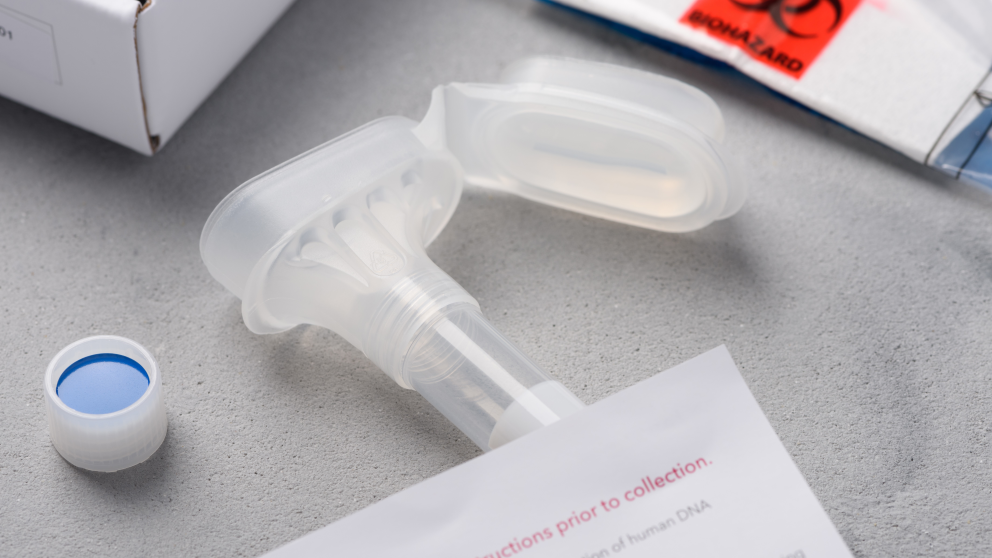
The Jackson Laboratory and University of Michigan reveal how genetic testing provided by the workplace impacts employee health choices and behaviors.
(FARMINGTON, Conn. – June 17, 2024) – Genetic testing is not yet a standard component of workplace wellness programs, but what if it were? Researchers at The Jackson Laboratory and the University of Michigan aim to answer this question, and to consider the ethical and social implications associated with such offerings.
The work, which will published in the August issue of issue of Genetics in Medicine, provides real-world employee perspectives, following employer-sponsored genetic testing, as well as valuable insights into how employers make informed decisions about integrating genetic testing into their wellness programs.
The future of personal health
“Genetic testing may very well be the way of the future when it comes to personal health,” said Kunal Sanghavi, MBBS, M.S., CGC, Associate Director of Genetic Counseling at The Jackson Laboratory for Genomic Medicine and one of the leaders of this study. “These findings are highly relevant to the research we are doing at JAX, studying genetic markers and applying them to personalized medicine that could provide targeted care to the patients who need it the most.”
The survey-based study recruited participants from a large healthcare system employing approximately 30,000 individuals, who had been offered workplace genetic testing (wGT) as part of their wellness benefits. The wGT program, established in fall 2018, used a third-party testing service which included genes associated with increased risk for cancer and heart disease. Genes driving medication response (pharmacogenes) were also included - this type of testing can reveal an individual’s metabolic response to certain medications as well as susceptibility to side effects.
Of the 776 web survey respondents, 418 elected to have genetic testing and received results. The web survey collected information about their use of health services and their health behaviors after receiving their test results.
Twelve percent of the 418 employees who opted into testing reported that they received results indicating an increased risk for cancer and 9.5 percent received results that showed increased risk for heart disease. These individuals were 8.6 times more likely to follow up with a healthcare professional and 3.23 times more likely to make a health behavior change. Furthermore, among those that received genetic testing through their workplace, 31.4 percent received results from the pharmacogenomic testing that they felt might be informative for their future prescription medication use.
“Most participants reported that obtaining their genetic test results satisfied their curiosity about their health (74.7%),” said Elizabeth Charnysh, M.S., CGC, a genetic counselor at JAX and lead author of the study.
She noted that employees with negative test results (i.e., no detectable increased risk of cancer or heart diease) were more likely to feel that their test results reassured them they were healthy.
“However, all individuals have a baseline risk for cancer and heart disease. Having a negative test result also does not negate other factors that may increase a person’s risk for cancer or heart disease, such as lifestyle and family history,” said Charnysh, “so these findings raise some concerns about false reassurance and lack of understanding among employees.”
The broader implications of workplace genetic testing
The study is part of a larger project entitled “Ethical, Legal, Social and Policy Implications of Workplace Genetic Testing.” The project, led by Charles Lee, Ph.D., FACMG, scientific director and the Robert Alvine Family Endowed Chair and professor at The Jackson Laboratory for Genomic Medicine and University of Michigan Professor Scott Roberts, Ph.D., is employing a multi-step approach to gather employee and employer perspectives regarding genetic testing in the workplace. The goal is to help guide the future of wGT across the country. Charnysh also notes that insights from wGT may also inform other new genetic testing initiatives that are designed to be offered to others in the general population. Upcoming research from this team will delve deeper into ethical frameworks and the broader implications of workplace genetic testing, including its potential benefits, potential harms, and considerations for maximizing the former and minimizing the latter.
“It was encouraging to see that many employees who learned from wGT results of their elevated risk for cancer and heart disease were taking steps that might aid prevention of future disease,” said Roberts, a professor of Health Behavior and Health Education at the University of Michigan School of Public Health. “However, it will be important for future studies to examine whether these potential health benefits are truly realized among employees undergoing wGT.”
About the Jackson Laboratory
The Jackson Laboratory is an independent, nonprofit biomedical research institution with a National Cancer Institute-designated Cancer Center and nearly 3,000 employees in locations across the United States (Maine, Connecticut, California), Japan and China. Its mission is to discover precise genomic solutions for disease and empower the global biomedical community in the shared quest to improve human health. For more information, please visit www.jax.org.
About the University of Michigan School of Public Health
Since 1941, the University of Michigan School of Public Health has been pursuing a healthier, more equitable world through education, research and action. Ranked among the top schools of public health in the country, Michigan Public Health trains more than 1,300 graduate and undergraduate students each year. With more than 190 faculty and researchers across six academic departments and numerous collaborative centers and institutes, the school produces impactful research aimed at finding lasting solutions to pressing public health challenges. Compassion, innovation and inclusion drive Michigan Public Health faculty, staff, students and more than 18,000 alumni worldwide to pursue positive change and make a lasting impact on the health of the world. Learn more at publichealth.umich.edu.